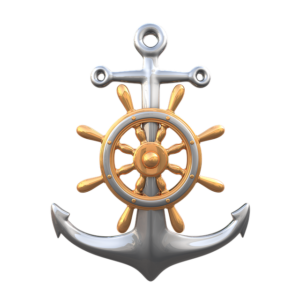Did you know that over 25% of people suffer from some form of boat phobia? Whether it’s a fear of deep water, feeling trapped on a boat, or the unpredictability of the waves, the fear of boats can be a debilitating experience for many.
But don’t let your fear hold you back from enjoying the open waters. With some practical tips and techniques, you can overcome your fear of boats and make your boating experience effortless.
As someone who has experienced boat phobia firsthand, I understand how overwhelming it can be. But I also know that with the right mindset and strategies, it is possible to conquer your fear and embrace the joys of boating.
In this article, we’ll delve into the root causes of boat phobia, identify triggers and coping strategies, and explore exposure therapy and basic boating skills. By the end, you’ll be equipped with the tools to face your fear head-on and have a relaxing and enjoyable boating experience.
Understanding the Root Causes of Boat Phobia
 Let’s delve into the underlying reasons behind boat phobia and gain some insight into what might be at the root of this common fear.
Let’s delve into the underlying reasons behind boat phobia and gain some insight into what might be at the root of this common fear.
One of the biggest misconceptions about boat phobia is that it’s solely related to a fear of water. While water can certainly be a trigger for some, boat phobia is often more complex than that. Many people who suffer from boat phobia may also have anxiety disorders or a fear of being out of control.
Another common root cause of boat phobia is past traumatic experiences. If you’ve ever been in a boating accident or witnessed one, it’s natural to develop a fear of boats. Similarly, if you’ve never been on a boat before, the unknown can be a scary prospect. It’s important to recognize that everyone’s experience with boats is unique, and what may be terrifying for one person may not be for another.
If you find that your boat phobia is significantly impacting your life, seeking professional help can be a great option. A therapist can help you work through any underlying anxiety or trauma that may be contributing to your fear. Additionally, taking a boating safety course or going out on a boat with a trusted friend or family member can help you feel more in control and comfortable.
Remember, it’s possible to overcome boat phobia with the right tools and support.
Identifying Triggers and Coping Strategies
Identifying triggers and learning coping strategies can help you navigate through challenging situations while out on the water. Whether it’s the sound of the engine, the smell of the saltwater, or the feeling of motion sickness, identifying what triggers your anxiety is the first step in overcoming your fear.
Once you’ve identified your triggers, you can begin to implement coping strategies to help manage your anxiety. Relaxation techniques are a powerful tool for managing anxiety. Deep breathing, meditation, and progressive muscle relaxation can all help to calm your mind and ease tension in your body.
By practicing these techniques regularly, you’ll be better equipped to handle stressful situations while out on the water. Cognitive therapy is another effective approach to managing anxiety. By challenging negative thoughts and replacing them with more positive and realistic ones, you can change the way you think about boating, making it a more enjoyable and less stressful experience.
Incorporating these coping strategies into your daily routine can help you overcome your fear of boats. Remember, it takes time and patience to overcome anxiety, but with the right tools and techniques, you can conquer your fears and enjoy all the joys that boating has to offer.
By identifying your triggers and learning how to manage your anxiety, you can take control of your boating experience and make it effortless and enjoyable.
Building Confidence through Exposure Therapy
Ready to boost your confidence on the water? Build your skills with exposure therapy, a proven method for conquering anxiety and enjoying the open sea.
Exposure therapy benefits those who struggle with fear of boats by gradually exposing them to the experience until they become desensitized to it. The approach involves starting with small steps, such as sitting on a docked boat, and gradually working up to more challenging tasks, such as taking a short ride.
One of the biggest challenges of exposure therapy is overcoming resistance. It’s essential to start with small, manageable tasks to build confidence and avoid overwhelming yourself. As you progress, you can start to increase the difficulty of your tasks.
It’s important to remember that progress might be slow, and setbacks may occur, but sticking with it will ultimately help you overcome your fear. Exposure therapy is an effective way to build confidence on the water.
With commitment and patience, you can develop the skills and mindset necessary to enjoy boating without fear. Remember to start small, focus on progress, and don’t give up if you experience setbacks. With time and practice, you can overcome your fear and enjoy the freedom of the open sea.
Learning Basic Boating Skills and Safety Measures
You’ll learn basic boating skills and safety measures to navigate the open sea with ease. Boating etiquette is essential to ensure a safe and enjoyable experience for everyone on board.
Before you set sail, it’s important to understand the rules of the waterways and how to communicate with other boaters. This includes learning how to properly navigate around other boats, maintain a safe speed, and understand the significance of various boating signals.
Navigation basics are also crucial for any boater. Understanding how to read a nautical chart, use a compass, and plot a course can make all the difference in your boating experience. You’ll also want to be familiar with the various aids to navigation, such as buoys, beacons, and markers. Knowing how to use these tools can help you avoid hazards and stay on course.
While learning basic boating skills and safety measures may seem overwhelming at first, it’s important to remember that practice makes perfect. Take a boating course, read up on boating regulations, and don’t be afraid to ask for help from experienced boaters.
With time and practice, you’ll be able to navigate the open sea with confidence, knowing that you have the skills and knowledge to keep yourself and others safe on the water.
Embracing the Joy of Boating: Tips for a Relaxing and Enjoyable Experience
Once you’ve mastered the basics and feel confident on the water, it’s time to embrace the joy of boating and fully relax into the experience. For many people, boating is a way to escape the hustle and bustle of everyday life and find peace in nature.
To fully enjoy your boating experience, it’s important to learn some relaxation techniques that will help you let go of any stress and anxiety you may be feeling. One of the best ways to relax on a boat is to simply take in the scenery. Whether you’re cruising along the coast or exploring a quiet cove, there’s always something beautiful to see on the water.
Take some time to appreciate the natural world around you, and let the peacefulness of the water wash over you. You can also try deep breathing exercises, meditation, or yoga to help you relax and let go of any tension.
Another key to a relaxing and enjoyable boating experience is having the right gear. Make sure you have everything you need before you head out on the water, including life jackets, sunscreen, hats, and snacks. Having a comfortable seating area and a good sound system can also go a long way in creating a relaxing atmosphere.
With the right gear and a relaxed mindset, you’ll be able to fully enjoy all the joys of boating.
How much does it cost to rent a boat for a day?
Looking to rent a boat for a day? Boat rental prices can vary depending on the location and size of the vessel.
Popular rental destinations include coastal cities and lakeside towns. In general, smaller boats like kayaks or paddleboards can be rented for as little as $20-$30 per hour, while larger boats like pontoons or speedboats can cost upwards of $500 for a full day rental.
It’s important to note that additional fees may be added for gas, insurance, and other amenities. When planning your boating excursion, be sure to research rental companies and compare prices to find the best deal for your budget.
What are the most common injuries that occur while boating?
Imagine the sun beating down on your skin, the wind blowing through your hair, and the waves crashing against the side of the boat. The excitement of being out on the water can quickly turn sour if you or someone you know gets injured while boating.
Boating injuries are unfortunately common, but there are prevention tips and recovery strategies that can help. It’s important to take precautions such as wearing life jackets, staying alert, and avoiding alcohol while operating a boat.
In the event of an injury, seek medical attention immediately and follow a proper recovery plan. The impact of boating injuries can also extend beyond physical harm, affecting mental health and family life.
As someone with experience on the water, it’s crucial to prioritize safety and take necessary steps to prevent and address injuries.
Can a fear of water in general be overcome through exposure therapy while boating?
If you have a fear of water in general, exposure therapy while boating can be an effective method for overcoming it.
Exposure therapy involves gradually exposing yourself to the source of your fear until it no longer causes anxiety.
In the case of a fear of water, this could involve starting with small steps like standing near a pool or lake, then progressing to putting your feet in the water, and eventually taking a short boat ride.
Professional help options, such as working with a therapist who specializes in anxiety and phobias, can also be beneficial in conjunction with exposure therapy.
With commitment and patience, exposure therapy can help you conquer your fear of water and enjoy boating without anxiety.
How do you properly maintain a boat to ensure safety and longevity?
So, you’ve finally decided to take the plunge and invest in a boat. Congratulations!
Now, before you hit the water, let’s talk about boat maintenance tips and safety measures. First things first, make sure you have all the necessary safety equipment on board and that it’s in good working order. This includes life jackets, fire extinguishers, navigation lights, and distress signals.
Next, establish a routine maintenance schedule for your boat. This should include regular cleaning, checking for any leaks or damage, and changing the oil and filters. Additionally, make sure to properly store your boat when not in use to prevent damage from the elements.
By following these boat maintenance tips and safety measures, you’ll ensure a safe and enjoyable boating experience every time.
Congratulations on taking the first step in overcoming your fear of boats! By understanding the root causes of your phobia, identifying triggers and coping strategies, building confidence through exposure therapy, and learning basic boating skills and safety measures, you can embrace the joy of boating and enjoy a relaxing and enjoyable experience on the water.
It’s important to remember that everyone experiences fear and anxiety at some point in their lives, and it’s perfectly normal to feel nervous when trying something new. However, with the right mindset and a willingness to learn and grow, you can conquer your fear of boats and create unforgettable memories on the water.
So, why not take the plunge and start your boating journey today? With these practical tips and techniques, you’ll be cruising in no time!





